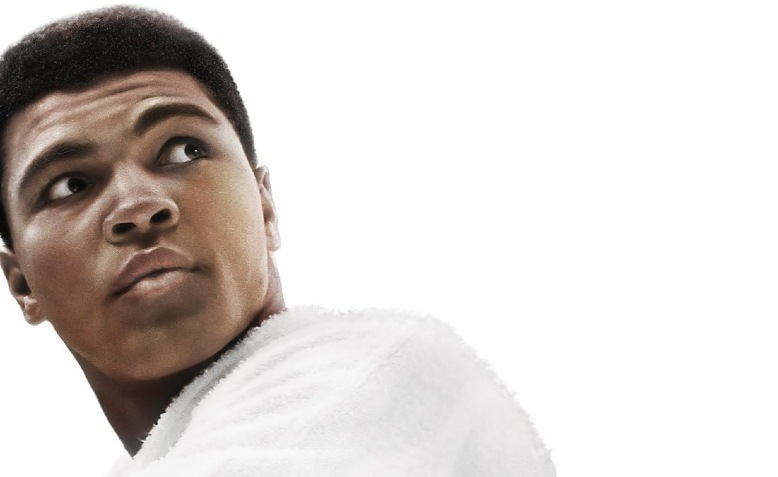 Muhammad Ali, BBC
Muhammad Ali, BBC
Exhaustive but not exhausting, Mark Dee Smith goes twelve rounds with our side’s most enduring sporting icon
“No Vietcong ever called me nigger.”
No slogan from the 1960s comes close to encapsulating the twin horrors of war and racism in such raw, irreducible terms. It also contained a demand, a refusal to fight in the white bosses’ war and threatened to break the link between imposed military service and national identity.
Terms like “influencer” or “inspiration” even can’t come close to capturing the impact Kentucky-born Cassis Clay (soon to be Muhammad Ali) had on entire generation of black young Americans caught up in the nascent civil rights movement. “Humble” was the self-presentation of even the proudest black entertainers; the righteous self-affirmation of Ali didn’t reflect the times, it set them ablaze.
Ali was born into the Jim Crow world of racial segregation. Talent, charisma, good looks shot through a personal prism set by the teachings of dissident Muslim Elijah Muhammad and the vaudeville of wrestler Gorgeous George soon saw Ali redrafting the rules of boxing on his own terms.
It is an indicator of US racism that professional boxing was one of the very few escape routes for a young black man. If Ali was going to break through on his own, he was a least going to give space and hope to others. As with his erstwhile friend Malcom X, Ali’s faith gave him a global perspective that ate away at any US exceptionalism and underpinned his rejection of the draft.
This would be enough drama for anyone’s life, but this is only one inseparable aspect of a sporting career that can only be described as Homeric. Three-times heavyweight champion of the world, fifty-six wins out of sixty-one fights with bouts across three continents.
It was crucial for his status as a black hero that he could turn defeat into victory and remain unbroken, to show to the white world the old days were over.
The Ken Burns documentary is as much a staple of the US cultural mainstream as Disney. The Ken Burns effect has been identified as a distinct technique but it’s only part of a suite of recognisable production values: prime cut footage, temperate music cues and talking heads who aren’t reading from a script. It is rare for any filmmaking style to be attributed to an individual, let alone in the course of a working lifetime. It is enthralling and seductive stuff that wears its manipulation on its sleeve. The eight hours of this television flies by.
But Ken Burns is no radical. The muted subtext of this series is that Ali is a Prodigal Son: the fiery hothead ultimately received by a nation that can learn and heal for everyone, even the BLM activist shown with the Ali t-shirt in the series’ coda.
The documentary’s singular weakness is its depiction of the Nation of Islam. The series is keen to highlight the group’s dubious hucksterism but there’s no serous assessment of the group’s ideological pull. What was there in this organisation that reshaped the lives of both Muhammad Ali and Malcolm X – the two black freest men of the twentieth century according to philosopher-activist Cornel West. (These tensions and dynamics are more competently handled in the Netflix film ‘Blood Brothers: Malcolm X & Muhammad Ali’ which functions here as a necessary companion piece.)
Ali is portrayed by Burns as a renegade in the mid-sixties, as despised by “moderate” blacks as he is the white mainstream. Yet by the 70s Ali is “a man of the people”. This is presented as happenstance with no indication of the causal relationship between movements, leaders and wider consciousness. Team Burns refuses to follow through with the implications of its own narrative.
But these are mere blemishes on a series with the power to captivate those with no real interest in boxing even. The series’ use of music is outstanding with a playlist doubling as a roll-call of twentieth century black American music of the twentieth century; Bo Diddley, Mos Def, Nina Simone and Dexter Gordon included. The use of Hendrix in the “What’s My Name?” section with Ali taking on Ernie Terrell and Cleveland Williams is pure intoxication.
But the most powerful sections of the series are the testimonies of those whose lives and self-perception were transformed by Ali: Walter Mosley, Gerald Early, Michael Bentt and Salim Muwakkil in particular. It is salutary what effect one individual can have on people in the grip of hardcore racism.
Bob Dylan called Ali “the bravest, most excellent of men. If the measure of greatness is to gladden the heart of every human being on the face of the earth, then he truly was the greatest.” Burns’ panoramic film more than captures this. A cursory glance at the US today shows that anti-racist struggles are far from over, but Muhammad Ali’s capacity to embolden and inspire remains.
‘Muhammad Ali’ is available on BBC iPlayer
Before you go
Counterfire is growing faster than ever before
We need to raise £20,000 as we are having to expand operations. We are moving to a bigger, better central office, upping our print run and distribution, buying a new printer, new computers and employing more staff.

